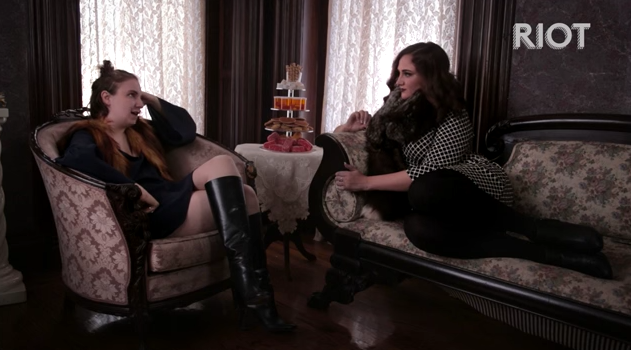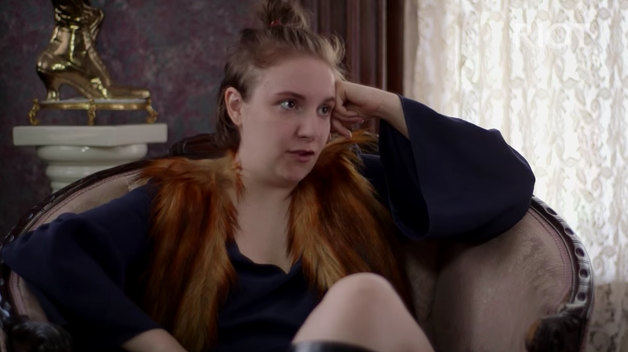Lena Dunham Nails What Depression Actually Looks Like

By:
Depression is depicted in myriad, contradictory ways in popular media — especially when it comes to women.
In a Refinery 29 RIOT video segment with comedian Jacqueline Novak, the author of "How to Weep in Public: Feeble Offerings on Depression from One Who Knows," Lena Dunham bravely revealed what depression really looks like, and playfully addresses where both high-brow and low-brow art get it wrong.
 Youtube/RIOT - youtube.com
Youtube/RIOT - youtube.com
"I feel like there's this glamour when you look at a Tennessee Williams play where the woman who has [a] psychological illness is always in a fur laid out on a chaise," Dunham said candidly. "Whereas in reality, a woman with mental illness or a woman struggling with her psychological well-being, is in sweats and a t-shirt that used to belong to her dad that's covered in food bits."
 Youtube/RIOT - youtube.com
Youtube/RIOT - youtube.com
There's a long history of fetishizing female mental illness.
Dunham mentions Tennessee Williams — presumably referencing Williams' charming vixen Blanche Dubois, who suffers a psychotic break at the end of "A Streetcar Named Desire" — but the segment also visually references another popular work on the trashier side of the contemporary media canon, "Valley of the Dolls" — the campy 1966 Jacqueline Susann novel about starlets who succumb to pill addictions and the dangerous allure of Hollywood.
The set of the segment and its intro is a nod to the 1967 film adaptation of "Valley of the Dolls," with shots of pills scattering mimicking shots and posters of the cult classic.
 Youtube/RIOT - youtube.com
Youtube/RIOT - youtube.com
Dunham also referenced Susann's novel on the cover of her own essay collection, "Not That Kind of Girl: A Young Woman Tells You What She's Learned," which borrowed its composition and typography from Susann, to contrast Dunham's candid reflections on female mental health with the caricatures presented in the salacious guilty pleasure.
In the segment, Dunham points out that it can be fun to paint depression and mental illness in opulent, stylized ways — but it's also important to point out that there is nothing glamorous about the everyday experience of living with depression or anxiety. Dunham and Novak shared how depression led them to avoid leaving their homes for days and order underwear from Amazon Prime instead of doing laundry.
This isn't the first time Lena Dunham has spoken out about mental health.
Dunham opened up about obsessive compulsive disorder numerous times in her book "Not That Kind of Girl," in interviews, and in a Season 2 episode of "Girls" in which Dunham's character, Hannah, exhibited obsessive thoughts and compulsions that culminated in her sticking a cotton swap deep into her ear.
In April 2015, the actress shared a 'workout selfie' where she bravely shared her lifelong battle with mental illness and the importance of exercise to combat symptoms of anxiety, OCD, and depression, as The Huffington Post pointed out.
